初中英语动词短语归纳教案资料
- 格式:doc
- 大小:37.00 KB
- 文档页数:3
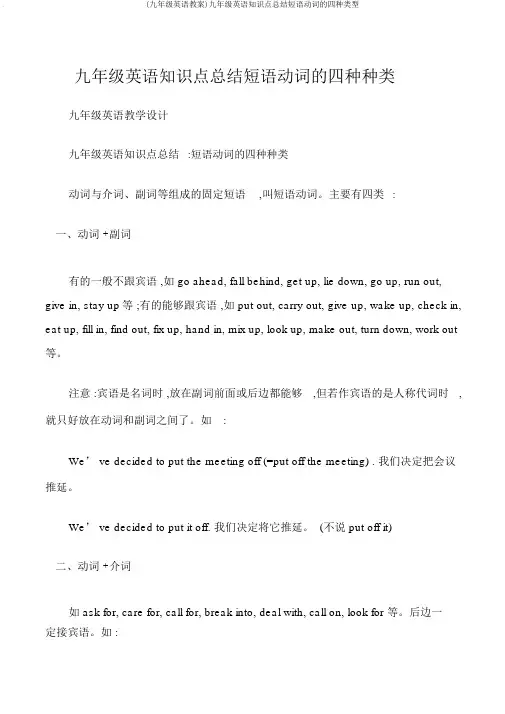
九年级英语知识点总结短语动词的四种种类九年级英语教学设计九年级英语知识点总结:短语动词的四种种类动词与介词、副词等组成的固定短语,叫短语动词。
主要有四类:一、动词 +副词有的一般不跟宾语 ,如 go ahead, fall behind, get up, lie down, go up, run out, give in, stay up等 ;有的能够跟宾语 ,如 put out, carry out, give up, wake up, check in, eat up, fill in, find out, fix up, hand in, mix up, look up, make out, turn down, work out 等。
注意 :宾语是名词时 ,放在副词前面或后边都能够,但若作宾语的是人称代词时,就只好放在动词和副词之间了。
如:We’ ve decided to put the meeting off (=put off the meeting) . 我们决定把会议推延。
We’ ve decided to put it off. 我们决定将它推延。
(不说 put off it)二、动词 +介词如 ask for, care for, call for, break into, deal with, call on, look for 等。
后边一定接宾语。
如 :I don ’ t care for tea我.不喜爱品茶。
三、动词 +副词 +介词如 look forward to, put up with, looked up to, go in for, go along with, date back to, look down on, keep up with, add up to, run out of 等。
如 :She soon caught up with us. 她很快追上了我们。


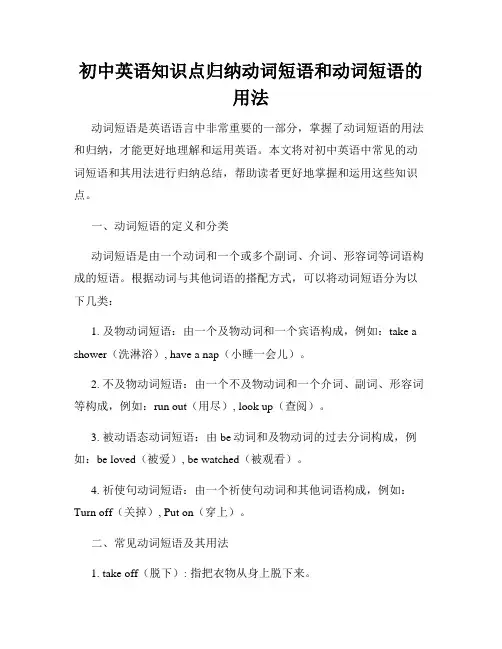
初中英语知识点归纳动词短语和动词短语的用法动词短语是英语语言中非常重要的一部分,掌握了动词短语的用法和归纳,才能更好地理解和运用英语。
本文将对初中英语中常见的动词短语和其用法进行归纳总结,帮助读者更好地掌握和运用这些知识点。
一、动词短语的定义和分类动词短语是由一个动词和一个或多个副词、介词、形容词等词语构成的短语。
根据动词与其他词语的搭配方式,可以将动词短语分为以下几类:1. 及物动词短语:由一个及物动词和一个宾语构成,例如:take a shower(洗淋浴), have a nap(小睡一会儿)。
2. 不及物动词短语:由一个不及物动词和一个介词、副词、形容词等构成,例如:run out(用尽), look up(查阅)。
3. 被动语态动词短语:由be动词和及物动词的过去分词构成,例如:be loved(被爱), be watched(被观看)。
4. 祈使句动词短语:由一个祈使句动词和其他词语构成,例如:Turn off(关掉), Put on(穿上)。
二、常见动词短语及其用法1. take off(脱下): 指把衣物从身上脱下来。
例句:He took off his jacket and hung it on the chair.2. give up(放弃): 表示放弃某个行动或者习惯。
例句:She gave up smoking for the sake of her health.3. look after(照顾): 指照料或者照顾某人或某物。
例句:My sister will look after my pet dog when I go on vacation.4. turn on(打开): 指通过开关或按钮使某物开始工作。
例句:Can you turn on the TV? I want to watch the news.5. work out(解决): 表示解决某个问题或达成某个目标。
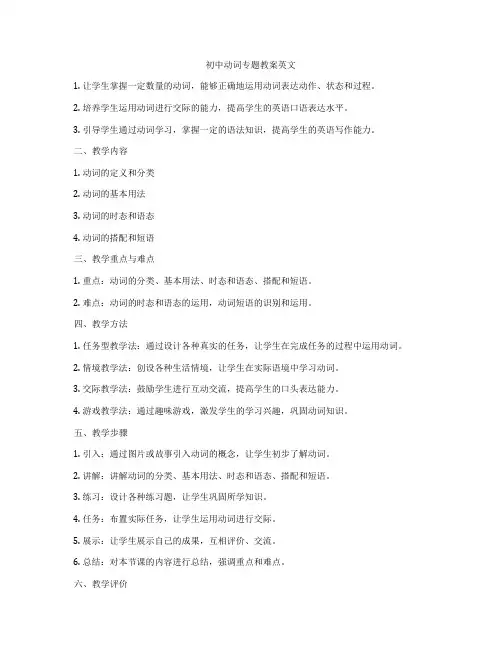
初中动词专题教案英文1. 让学生掌握一定数量的动词,能够正确地运用动词表达动作、状态和过程。
2. 培养学生运用动词进行交际的能力,提高学生的英语口语表达水平。
3. 引导学生通过动词学习,掌握一定的语法知识,提高学生的英语写作能力。
二、教学内容1. 动词的定义和分类2. 动词的基本用法3. 动词的时态和语态4. 动词的搭配和短语三、教学重点与难点1. 重点:动词的分类、基本用法、时态和语态、搭配和短语。
2. 难点:动词的时态和语态的运用,动词短语的识别和运用。
四、教学方法1. 任务型教学法:通过设计各种真实的任务,让学生在完成任务的过程中运用动词。
2. 情境教学法:创设各种生活情境,让学生在实际语境中学习动词。
3. 交际教学法:鼓励学生进行互动交流,提高学生的口头表达能力。
4. 游戏教学法:通过趣味游戏,激发学生的学习兴趣,巩固动词知识。
五、教学步骤1. 引入:通过图片或故事引入动词的概念,让学生初步了解动词。
2. 讲解:讲解动词的分类、基本用法、时态和语态、搭配和短语。
3. 练习:设计各种练习题,让学生巩固所学知识。
4. 任务:布置实际任务,让学生运用动词进行交际。
5. 展示:让学生展示自己的成果,互相评价、交流。
6. 总结:对本节课的内容进行总结,强调重点和难点。
六、教学评价1. 课堂参与度:观察学生在课堂上的积极参与程度,了解学生的学习兴趣。
2. 口头表达能力:评估学生在口语交际中的动词运用情况,提高学生的口头表达能力。
3. 作业和练习:检查学生的作业和练习,了解学生的学习效果。
4. 单元测试:定期进行单元测试,评估学生的动词掌握情况。
通过以上教学设计,相信学生能够系统地掌握动词知识,提高英语综合素质。
在实际教学中,教师应根据学生的实际情况,灵活调整教学方法,确保教学效果。
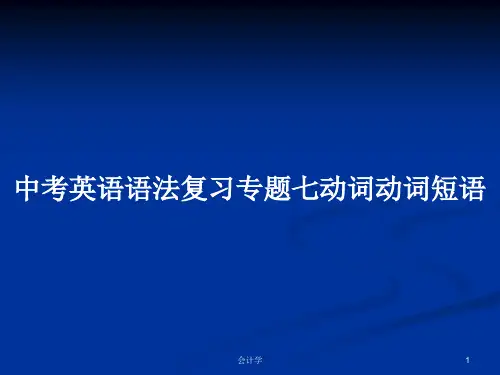
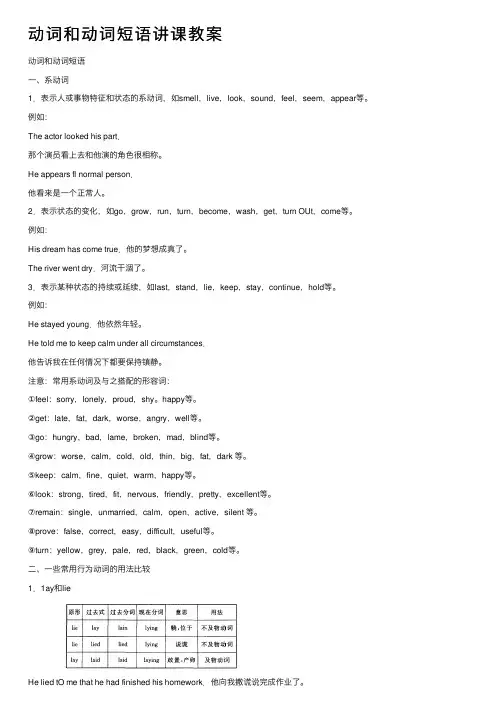
动词和动词短语讲课教案动词和动词短语⼀、系动词1.表⽰⼈或事物特征和状态的系动词,如smell,live,look,sound,feel,seem,appear等。
例如:The actor looked his part.那个演员看上去和他演的⾓⾊很相称。
He appears fl normal person.他看来是⼀个正常⼈。
2.表⽰状态的变化,如go,grow,run,turn,become,wash,get,turn OUt,come等。
例如:His dream has come true.他的梦想成真了。
The river went dry.河流⼲涸了。
3.表⽰某种状态的持续或延续,如last,stand,lie,keep,stay,continue,hold等。
例如:He stayed young.他依然年轻。
He told me to keep calm under all circumstances.他告诉我在任何情况下都要保持镇静。
注意:常⽤系动词及与之搭配的形容词:①feel:sorry,lonely,proud,shy。
happy等。
②get:late,fat,dark,worse,angry,well等。
③go:hungry,bad,lame,broken,mad,blind等。
④grow:worse,calm,cold,old,thin,big,fat,dark 等。
⑤keep:calm,fine,quiet,warm,happy等。
⑥look:strong,tired,fit,nervous,friendly,pretty,excellent等。
⑦remain:single,unmarried,calm,open,active,silent 等。
⑧prove:false,correct,easy,difficult,useful等。
⑨turn:yellow,grey,pale,red,black,green,cold等。
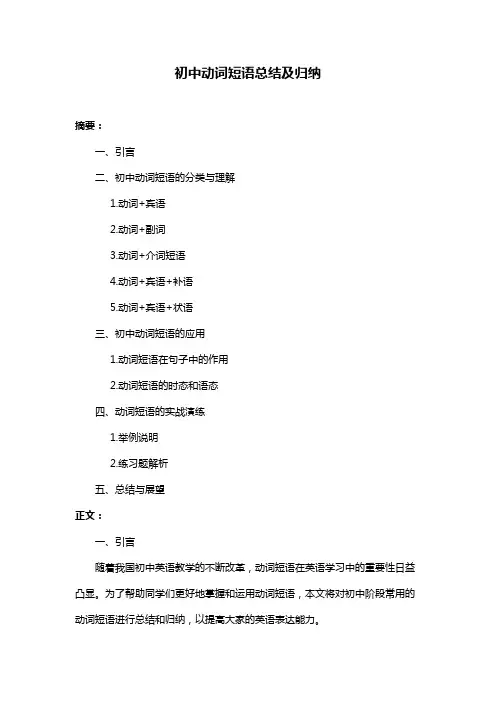
初中动词短语总结及归纳摘要:一、引言二、初中动词短语的分类与理解1.动词+宾语2.动词+副词3.动词+介词短语4.动词+宾语+补语5.动词+宾语+状语三、初中动词短语的应用1.动词短语在句子中的作用2.动词短语的时态和语态四、动词短语的实战演练1.举例说明2.练习题解析五、总结与展望正文:一、引言随着我国初中英语教学的不断改革,动词短语在英语学习中的重要性日益凸显。
为了帮助同学们更好地掌握和运用动词短语,本文将对初中阶段常用的动词短语进行总结和归纳,以提高大家的英语表达能力。
二、初中动词短语的分类与理解1.动词+宾语这类短语是指动词与宾语直接搭配,如:eat breakfast(吃早餐),do homework(做作业)等。
这是初中阶段最常见的动词短语类型。
2.动词+副词这类短语是指动词与副词搭配,如:run quickly(跑得快),write carefully(写得认真)等。
副词用于修饰动词,表示动作的程度、方式等。
3.动词+介词短语这类短语是指动词与介词短语搭配,如:look for(寻找),wait for(等待)等。
介词短语在此起到补充说明动作的作用。
4.动词+宾语+补语这类短语是指动词与宾语、补语搭配,如:make the cake(做蛋糕),find the book(找到书)等。
补语用于补充说明宾语的状态或结果。
5.动词+宾语+状语这类短语是指动词与宾语、状语搭配,如:sing loudly(大声唱),read in the library(在图书馆阅读)等。
状语用于说明动作的时间、地点等。
三、初中动词短语的应用1.动词短语在句子中的作用动词短语在句子中可以作为谓语、宾语、表语等成分。
如:- I"m going to do my homework.(我要做作业。
)- She likes reading books.(她喜欢看书。
)2.动词短语的时态和语态根据句子中的时态和语态,动词短语会有相应的变化。
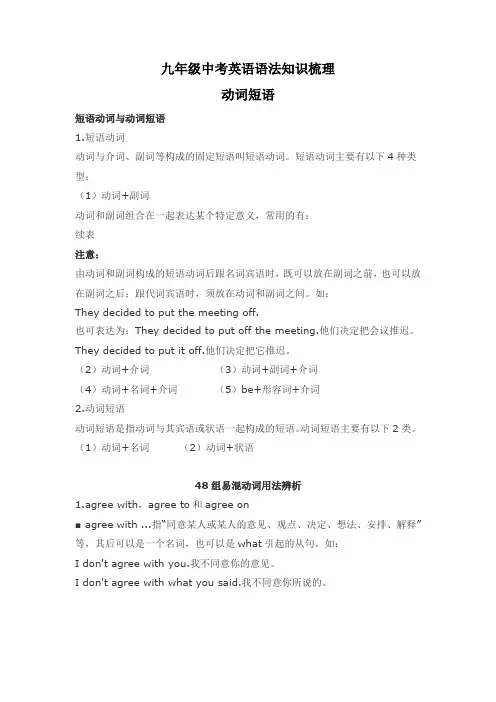
九年级中考英语语法知识梳理动词短语短语动词与动词短语1.短语动词动词与介词、副词等构成的固定短语叫短语动词。
短语动词主要有以下4种类型:(1)动词+副词动词和副词组合在一起表达某个特定意义,常用的有:续表注意:由动词和副词构成的短语动词后跟名词宾语时,既可以放在副词之前,也可以放在副词之后;跟代词宾语时,须放在动词和副词之间。
如:They decided to put the meeting off.也可表达为:They decided to put off the meeting.他们决定把会议推迟。
They decided to put it off.他们决定把它推迟。
(2)动词+介词(3)动词+副词+介词(4)动词+名词+介词(5)be+形容词+介词2.动词短语动词短语是指动词与其宾语或状语一起构成的短语。
动词短语主要有以下2类。
(1)动词+名词(2)动词+状语48组易混动词用法辨析1.agree with,agree to和agree on■agree with ...指“同意某人或某人的意见、观点、决定、想法、安排、解释”等,其后可以是一个名词,也可以是what引起的从句。
如:I don't agree with you.我不同意你的意见。
I don't agree with what you said.我不同意你所说的。
■agree to是指“同意某计划、建议、或提议”等;后跟动词原形,意为“同意干某事”。
如:Who else will agree to this suggestion besides him?除他以外,还有谁会同意这个建议呢?We agreed to start early.我们同意早点动身。
■agree on 指在某方面取得一致的看法或意见。
如:We agreed on leaving for Beijing the next day.我们一致同意第二天去北京。
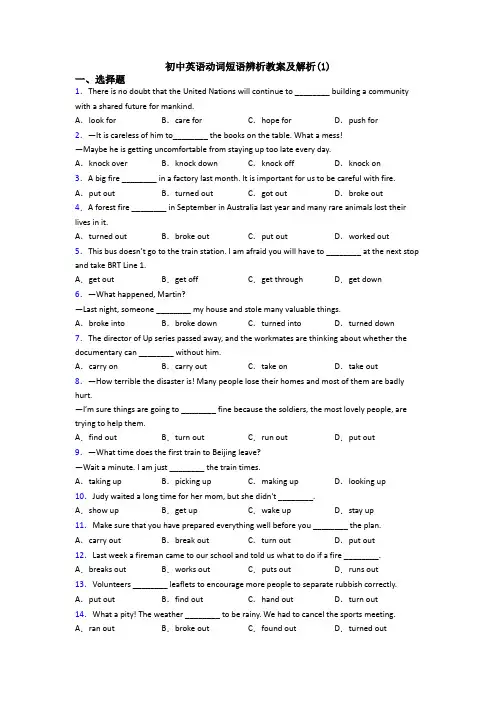
初中英语动词短语辨析教案及解析(1)一、选择题1.There is no doubt that the United Nations will continue to ________ building a community with a shared future for mankind.A.look for B.care for C.hope for D.push for2.—It is careless of him to________ the books on the table. What a mess!—Maybe he is getting uncomfortable from staying up too late every day.A.knock over B.knock down C.knock off D.knock on3.A big fire ________ in a factory last month. It is important for us to be careful with fire. A.put out B.turned out C.got out D.broke out4.A forest fire ________ in September in Australia last year and many rare animals lost their lives in it.A.turned out B.broke out C.put out D.worked out 5.This bus doesn’t go to the train station. I am afraid you will have to ________ at t he next stop and take BRT Line 1.A.get out B.get off C.get through D.get down 6.—What happened, Martin?—Last night, someone ________ my house and stole many valuable things.A.broke into B.broke down C.turned into D.turned down 7.The director of Up series passed away, and the workmates are thinking about whether the documentary can ________ without him.A.carry on B.carry out C.take on D.take out 8.—How terrible the disaster is! Many people lose their homes and most of them are badly hurt.—I’m sure thing s are going to ________ fine because the soldiers, the most lovely people, are trying to help them.A.find out B.turn out C.run out D.put out 9.—What time does the first train to Beijing leave?—Wait a minute. I am just ________ the train times.A.taking up B.picking up C.making up D.looking up 10.Judy waited a long time for her mom, but she didn't ________.A.show up B.get up C.wake up D.stay up 11.Make sure that you have prepared everything well before you ________ the plan. A.carry out B.break out C.turn out D.put out12.Last week a fireman came to our school and told us what to do if a fire ________. A.breaks out B.works out C.puts out D.runs out 13.Volunteers ________ leaflets to encourage more people to separate rubbish correctly. A.put out B.find out C.hand out D.turn out 14.What a pity! The weather ________ to be rainy. We had to cancel the sports meeting. A.ran out B.broke out C.found out D.turned out15.Please _____ the water when you brush your teeth.A.take down B.turn up C.take away D.turn off16.I’ve had some difficulties, but they were nothing compared _____ yours.A.to B.of C.for D.from17.All of us had a good time during this year’s May Day holiday because we ________ five days________ .A.had...off B.took...off C.put...off D.turned...off 18.—Hello, this is Taicang Middle School.—I want to talk to Mr. Chen. Can you ________ me ________?A.put…in B.put…out C.put…through D.put…up19.The rain has stopped. Why not ________ the raincoat?A.take away B.pass away C.put away D.put off 20.There’s no d oubt the Belt and Road will successfully ________ cooperation and development between China and other countries along the line.A.push for B.care for C.look for D.hope for21.The book is written by T. C.Smith.What does the “T. C.”?A.pay attention to B.regard as C.stand for D.set off22.—I ________ reading English every morning.—Yes, English is very important and it ________ the first language in England and some other countries.A.used to; is used by B.used to; is used asC.am used to; is used as D.am used to; is used by23.—How was your May Day holiday?—Just so-so. We drove to Suzhou and tried to find a place for parking, but they were all________. A.turned up B.stayed up C.taken up D.put up 24.Would you please ____________ the light? I can't sleep well with it on.A.turn on B.turn off C.turn to D.turn around 25.—I’m sorry to ________ on you, but there is something I don’t understand.—It doesn’t matter.A.cut down B.cut out C.cut in D.cut off26.Far water does not ________ near fire.A.put up B.put away C.put out D.put in27.—In order to improve my English, I have already made a detailed plan.—Great! I think all you need to do next is _________.A.pick it out B.carry it out C.find it out D.point it out 28.Much to everyone’s surprise, Hi, Mom ________ to be a biggest hit.A.turns out B.puts out C.carries out D.breaks out 29.The job ________ to be harder than they thought.A.found out B.turned out C.ran out D.worked out30.Andrew once tried to ________ a brighter light in his bedroom, but he failed in the end. A.put on B.put in C.put out D.put up31.I promise I won’t ________ any more of your time. But would you please reply to my question right away?A.give up B.make up C.put up D.take up32.-Oh,my God! I have ________ five pounds!-No worries. It’s normal for a growing teenage girl.A.put up B.put down C.put on D.put off 33.—Many students don’t know how to ________ stress and become worried.—I think they’d better ask their teachers for help.A.argue with B.come up with C.deal with34.Bob is busy taking the desks and chairs away because they ___________ too much room in the hall.A.pick up B.take up C.put up D.cheer up 35.—All right, I’ll take it. But I tell you, it is the last time I will _________ this kind of work —Come on, Buddy! Don’t be so serious.A.take off B.take out C.take on D.take up36.— Excuse me, which is the way to Kaiming Middle School?—________ this street, and you’ll find it on your right.A.Write down B.Go down C.Lie down D.Sit down37.As a volunteer, he often goes to the hospital to ________ the sick.A.cheer for B.help for C.put up D.cheer up38.My brother often _________ his spare time to help me with my spoken English.A.puts up B.gives up C.opens up D.tidies up 39.Daniel, stop playing computer games, please! It has ________ your free time too much. A.turned up B.picked up C.put up D.taken up 40.—Why did Linda come to China?—To experience Chinese culture and ________ the most suitable university to attend.A.turn out B.put out C.run out D.find out41.Life is full of ups and downs. When your friends are unhappy, tell them something funny and encourage them to ________.A.put up B.cheer up C.stay up D.give up42.The person who ________ a new idea of how to work out the puzzle will be given a(n)________.A.keeps up with; praise B.comes up with; prize C.ends up with; price D.puts up with; award43.—Your spoken English is very good. How do you improve it?—Thanks. Mrs. Wang always asks us to ________ dialogues in our English classes and practice speaking English as often as possible.A.take up B.make up C.put up D.mop up44.—Who is the best basketball player in your class?—Daniel. And he takes any chance to ________ his sports skills to girls.A.take off B.turn off C.fall off D.show off45.________ the way you talk. You won’t want to make others feel uncomfortable.A.Pay attention to B.Hold on toC.Come up with D.End up with46.If parents do everything for their children, they won’t learn to ________ themselves. A.depend on B.get on C.put on D.come on47.My father is crazy abou t DIY. He’s trying to ________ a cupboard in the kitchen.A.put up B.put in C.put on D.put away48.I know how busy you must be and I wouldn’t want to ________ too much of your time. A.put up B.take up C.set up D.make up 49.—Have you made a plan to raise money to protect the animals in danger?—Yes. Now we are thinking about how to ________.A.pick it out B.carry it out C.find it out D.put it out 50.The baby is sleeping. Would you please ________?A.turned the radio on B.turn the radio downC.turned the radio off D.turn the radio up【参考答案】***试卷处理标记,请不要删除一、选择题1.D解析:D【详解】句意:毫无疑问,联合国将继续推动构建人类命运共同体。
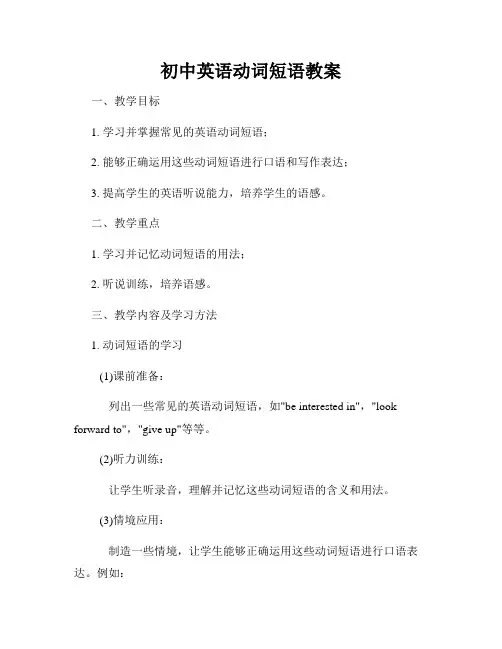
初中英语动词短语教案一、教学目标1. 学习并掌握常见的英语动词短语;2. 能够正确运用这些动词短语进行口语和写作表达;3. 提高学生的英语听说能力,培养学生的语感。
二、教学重点1. 学习并记忆动词短语的用法;2. 听说训练,培养语感。
三、教学内容及学习方法1. 动词短语的学习(1)课前准备:列出一些常见的英语动词短语,如"be interested in","look forward to","give up"等等。
(2)听力训练:让学生听录音,理解并记忆这些动词短语的含义和用法。
(3)情境应用:制造一些情境,让学生能够正确运用这些动词短语进行口语表达。
例如:Teacher: What are you interested in?Student: I'm interested in playing basketball.(4)书面训练:给学生一些书面任务,让他们能够在写作中正确使用这些动词短语。
四、教学过程1. 导入:利用图片或 realia 引入一些动词短语,激发学生对这些短语的兴趣。
2. 学习动词短语:让学生跟随录音逐个学习这些动词短语,并重复朗读和记忆。
3. 口语训练:运用情境设计一些问答练习,培养学生运用动词短语进行口语表达的能力。
4. 阅读练习:制作一些阅读材料,让学生读并找出其中的动词短语,加深对其理解并提高阅读能力。
5. 书面训练:给学生一些书面任务,要求他们在书写中正确使用这些动词短语,提高写作能力。
五、巩固与拓展1. 情景演练:设计一些情景,让学生根据情景要求运用所学动词短语进行演练,加深理解并提高语感。
2. 课外拓展:鼓励学生在课余时间多阅读英语资料,积累更多的动词短语,并灵活运用于实际生活和学习中。
六、教学反思本节课通过听说训练、口语训练和书面训练等多种形式,全面培养了学生对英语动词短语的学习和运用能力。
通过情景训练和拓展任务,帮助学生更好地理解和运用这些动词短语。
初中动词的分类教案教学目标:1. 掌握动词的基本概念和用法。
2. 学会分类动词并根据语境选择合适的动词。
3. 提高学生的语言表达能力和写作能力。
教学重点:1. 动词的分类和用法。
2. 根据语境选择合适的动词。
教学难点:1. 动词分类的理解和应用。
2. 动词短语的搭配和使用。
教学准备:1. 教学PPT或黑板。
2. 动词卡片或动词图片。
3. 练习题和答案。
教学过程:Step 1:导入(5分钟)1. 引导学生回顾动词的基本概念,如动词的定义、作用等。
2. 提问学生:“你们在日常生活中用到动词的时候,有没有注意到动词的分类?”Step 2:讲解动词分类(15分钟)1. 讲解动词分类的依据,如及物动词、不及物动词、系动词等。
2. 举例说明各类动词的用法和特点。
3. 引导学生通过观察例句,理解各类动词的用法。
Step 3:动词分类练习(15分钟)1. 给出一些动词,让学生判断它们属于哪一类动词。
2. 让学生结合语境,选择合适的动词填空。
3. 学生互相检查答案,教师进行讲解和反馈。
Step 4:动词短语的学习(15分钟)1. 讲解动词短语的概念和作用。
2. 举例说明一些常见的动词短语及其用法。
3. 让学生进行动词短语的练习,如填空、造句等。
Step 5:写作练习(15分钟)1. 给出一个主题,要求学生用所学动词和动词短语进行写作。
2. 学生进行写作练习,教师进行指导和反馈。
Step 6:总结和作业布置(5分钟)1. 对本节课的内容进行总结,强调动词分类的重要性和用法。
2. 布置作业,要求学生复习本节课所学内容,并运用到实际语境中。
教学反思:通过本节课的教学,学生应该已经掌握了动词的基本分类和用法,能够根据语境选择合适的动词。
在教学过程中,要注意引导学生通过观察和练习,加深对动词分类的理解和应用。
同时,也要关注学生的写作能力,通过写作练习,让学生更好地运用所学知识。
2.初中英语要点词组初中英语教材中共出现近500个词组,此中有一部分为常用词组,要求能娴熟运用。
在学习中,要注意词组的累积,特别要注意介词词组和短语动词的累积。
3. 对固定词组的意义,切不行望文生义。
比如,动词look 原意为“看”,但lookafte r意为“照顾”,lookup(awordinadictionary)意为“(在词典中)查找(单词)”。
4.要十分注意固定词组中冠词的使用。
有时冠词可惹起词义的变化,比如:gotheschool意为“上学”,而gototheschool意为“到学校里去”;takeplace意为“发生”,而taketheplace意为“取代”。
有些词组中须用冠词,而另一些则不用。
比如:intheevening,atnight。
一、动词词组(包含短语动词)、介词词组和其余词组(一)由be组成的词组1)beback/in/out回来/在家/出门2)beathome/work在家/上班3)begoodat善于,善于于4)becarefulof 当心,注意,仔5)becoveredwith 被⋯⋯复盖6)bereadyfor ⋯⋯作好准7)besurprised(at) ⋯⋯感觉惊8)beinterestedin ⋯⋯感觉9)beborn 出生10)beon内行,在演出,(灯)亮着11)beabletodosth. 能做⋯⋯12)beafraidof(todosth.that ⋯) 惧怕⋯⋯(不敢做⋯⋯,唯恐⋯⋯)13)beangrywithsb. 生(某人)的气14)bepleased(with) ⋯⋯感觉高(意)15)befamousfor 以⋯⋯而有名16)bestrictin(with) (工作、人)格要求17)befrom 来自⋯⋯,什么地方人18)behungry/thirsty/tired 了/渴了/累了19)beworried 担20)be(well)worthdoing( 特别)得做⋯⋯21)becoveredwith 被⋯⋯所覆盖⋯⋯22)bein(great)needof (很)需要23)beintrouble 于窘境中24)begladtodosth. 很高做⋯⋯25)belatefor ⋯⋯到26)bemadeof(from) 由⋯⋯制成27)besatisfiedwith ⋯⋯感觉意28)befree 空的,有空29)be(ill)inbed 卧病在床30)bebusydoing(with) 忙于做⋯⋯(忙于⋯⋯)(二) 由come,do,get,give,go,have,help,keep,make,looke,put,set,send,take,turn,play 等组成的1)comeback 回来2)comedown 下来3)comein 入,来comeon快,走吧,跟我来5)come out出来6)come outof从⋯⋯出来7)come up上来8)comefrom来自⋯⋯9)doone'slessons/hom ework做功/回家作10)domorespeaking/reading多做口/朗11)doone'sb est全力12)dosomeshopping(cookingreading,cleaning)西(做菜,点,大除)13)doagooddeed(gooddeeds)做一件好事(做好事)14)domorningexercises做晨操15)doeyeexercises做眼保健操dowellin在⋯⋯某方面干得好17)getup起身18)geteveryth ingready把全部都准好19)getreadyfor(=bereadyfor)⋯⋯作好准20)geton(well)with与⋯⋯相(和睦)21)getba ck返回22)getridof除去,去除23) getin入,采集24)geton/off上/下25) getto抵达26)getthere抵达那边27)givesb.acall⋯⋯打28)giveatalk作告29)givealecture(apianoconcert)作座(行琴音会)30)giveb ack,送回31) give⋯someadviceon⋯⋯一些忠告32)givelessonsto⋯⋯上33) givein折服34)giveu p放弃35)givesb.achance⋯⋯一次时机36)giveamessageto⋯⋯⋯一个口信37)goahe ad先走,向前走,去吧,干吧38)gotothecin ema看影39)gogob ed睡(makethebed整理床)40)gotoschool (college)上学(上大学)41)goto(the)hospital去医院看病42)goover一遍,复/gooverto朝⋯⋯走去43)gofishing/skating/swimming/shopping去/溜冰/游泳/西44)gohome(the re)回家去(去那边)45)goround便去,道走46) goup上去47)gooutforaw alk出门漫步48)goon(doing)(做⋯⋯)49)goonwithon e'swork某人的工作50)goupstairs/downst上/下楼airs51)(thelights )goout(灯)熄了52)havealesson(lessons)/ameeting上/开会53)haveafootballmatch(basketballmatch)行一足球(球)54)havedictation听55)haveatry一56)haveagood/wonderfulti me玩得很高57)havealecture(apianoconcert)听座(听琴音会)58)haveareport (talk)on 听一个对于⋯⋯的告59)haveaglassofwater(acupoftea)喝一杯水,(一杯茶)60)havebreakfast/lunch/supper吃早/午/晚61)haveameal(threemeals)吃一(三餐)62)haveadinner吃正餐63)havebreadandmilkforbreakfast早吃面包和牛奶64)have(havegot)aheadache痛65)haveafever66)haveacough(acold)咳嗽(感冒)67)havealook( at)看一看⋯⋯68)havearest(abreak)歇息一会儿(工或歇息)69)haveatalk70)haveaswim/walk游泳/漫步71)haves ports行体育72)haveasportsmeet(meeting)开运会73)havesomethingdone人(人)做⋯⋯74)haveatest/anexam/考75)havea nidea有了个想法76)hadbetterdosth.(not dosth.)最好做⋯⋯(最好不要做⋯⋯)77)haveawordwith与⋯⋯几句78)helpsb.withsth.helpsb.dosth.在⋯⋯方面帮助⋯⋯帮助⋯⋯做79)helponeselftosomechicken/fish/meat随意吃点//肉80)helpeachot her相互帮助81)keepupwith跟上⋯⋯,不落伍于⋯⋯82)keepsilent/quiet保持缄默/寂静83)keepsb.doingsth.使⋯⋯向来做⋯⋯84)keepone'sdiary日85)makeanoise(alotofnoise,muchnoise,no ises)吵(十分嘈,响声)86)makealiving生87)makesb.dosth.迫使某人做⋯⋯88)makefaces( aface)做鬼89)makefriends(with)与⋯⋯交朋友90)makeamistake(mistakes)犯91)makeroom/spacefor⋯⋯出地方92)makeasentence(sente nces)with用⋯⋯造句93)makeafire生火94)bemadefrom /of由⋯⋯制成95)bemad ein 在⋯⋯地方制造96)lookoutof( outside)往外看(看外面)97)lookupaword(inthedi ctionary)词典98)lookup往上看,仰望lookafter照料,照看,照100)lookfor 找101)looklike 看上去像102)lookfine/well/tired/worried 看起来气色好/健康/疲/ 103)lookout 当心,当心104)lookon ⋯as ⋯把⋯⋯看作⋯⋯对待105)lookaround 朝周围看106)lookat 看着⋯⋯puton穿上(衣服),戴上(帽子),演出() putup建筑,搭起,挂起,起,帖109)putinto使入,入110)putone's heartinto全神注于11 1)put⋯down⋯把⋯⋯放下11 2)put⋯into⋯把⋯⋯成113)setup起,建起114)setoff出,身115)setout出116)setanexamplefor⋯⋯立榜117)sendfor派人去(叫)118)sendout放出,出119)endup把⋯⋯往上送,射120)takeone' sadvice遵从某人告121)takeout取出,取出122)takedown拿下123)takeplace生124)takeone'坐⋯⋯的座位,取代某splace人125)takethep laceof取代⋯⋯126)takeawal k/rest漫步/歇息127)takeiteasy128)takesb.随身着129)takesb.toapark/Londonforone'sholidays某人去公园/敦度假130)takec areof关怀,照,保存131)takealook(alastlook)at看一看(最后看一眼)132)takeanexam参加考133)takeaway拿走134)takeback回收,回135)takeholdof抓住⋯⋯136)takeoff脱下(衣,帽,鞋等)拿掉137)take(anactive)partin (极)参加(活)138)takephotos 摄影139)takesomemedicine 服140)takeabus/train/boat 乘公共汽,火/船141)turnon开,旋开(灯,收音机等)turnoff关上(灯,收音机等)143)turnin 交出,上交144)turn ⋯into ⋯成⋯⋯145)turnto 翻到,向146)turndown (把音量)低147)turn ⋯over 把⋯⋯翻来148)playbasketball/football/volleyb all打球/踢足球/打排球149)playga mes做游150)playthepiano(theviolin)琴(拉小提琴)151)playwi thsnow玩雪152)playajoke(on)⋯⋯开玩笑(三)由其余组成的153)thinko ver仔考154)arriveat/inaplace抵达某155)e atup吃完,吃光156)dowellin在⋯⋯干得好157)enjoydoingsth./likedoingsth.喜做某事/喜干某事158)findout,出(实情等)159)finish off吃完,喝完160)stopdoingsth.停止做某事161)stoptodosth.停下往来做某事162)holdam eting行会163)holdup起164)hurryu p赶忙,快点165)enterf or名参加166)langhtat嘲讽167)beusedto于168)u sedto去经常169)wake⋯up醒170)workout算出二、短、介短和其余1)askfor向⋯⋯要⋯⋯,求2)askforleave假3)sen dfor派人去(叫)4)pay for付⋯⋯的款5)waitfor等待6)thankfor⋯⋯感7)apologizetosb.fors th.某事向某人致歉8)lookfor找9)leave⋯for走开⋯⋯去⋯⋯10)falloff跌落11)catchco ld着凉,12)catchup with追上13)agreewithsb.成,赞同某人的意14)fi lled⋯with把⋯⋯装15)tellsb.aboutsth.告某人某事16)talkabout⋯⋯17)thinkab out考⋯⋯18)worryab out担⋯⋯19)lookafter照顾20)runafter追赶,跟在后边跑21)readafter跟⋯⋯22)smileat⋯⋯浅笑23)knockat敲(、窗)24)shoutat⋯⋯大叫(嚷)25)throwaway抛弃26)workha rdat努力做⋯⋯27)waitin line排等待28)ch ange⋯into⋯成⋯⋯29)hurryinto⋯仓促入⋯⋯30)runinto⋯跑⋯⋯31)hearof听⋯⋯32)thinkof,考⋯⋯33)catchh oldof抓住⋯⋯34)insteadof取代⋯⋯35)handin交上来36)stayin bed卧病在床37)hearfr收到⋯⋯om来信38)at once马上39)at last最后40)at first起初,第一41)attheageof⋯在⋯⋯42)attheendof⋯在⋯⋯之末43)atthebeginningof⋯在⋯⋯之初44)atthefootof在⋯⋯脚下45)atthesametime同46)atnight/noon在夜里/正午47)withon e'shelp在某人的帮助下,因为某人的帮助48)withthehelpof⋯在⋯⋯的帮助下49)withas mile面笑脸50)withone'sowneyes眼看51)aftera while了一会儿52)fromno won从在起53)fromth enon从那起54)farexample比如55)farawayfrom离56)frommorningtillnight从早到晚57)byandby不久58)byairm ail寄航空件59)byordinary mail寄平信60)bytheway便61)bythew indow在窗62)bytheendof⋯到⋯⋯底止63)little bylittle逐地64)inall共65)infact事上66)inone'stwenties在某人二十几67)ina hurry仓促68)inthemiddleof在⋯⋯中69)innotime(inaminute)马上,很快70)intime(ontime)及71)inpublic民众,公然地72)inorderto了⋯⋯73)infrontof在⋯⋯前方74)int hesun在阳光下75)intheend最后,于76)ins urprise诧异地77)inturn挨次78)ofc ourse自然79)abit(of)有一点儿80)alotof多81)onone's某人在去⋯⋯的路上wayto82)onf oot步行,走路83)atalkonspace一个对于太空的告84)ontheotherhand另一方面85)at/ontheweekend在周末86)ontheleft(right)在左(右)87)ontheothersideof在⋯⋯另一88)ontheradio通收音机(无广播)89)toone'sjoy使⋯⋯高的是90)toone'ssurprise使⋯⋯惊的是三、量和其余(一)量1)abit一点儿2)afew(of)一些(可数),几个⋯⋯3)alittle一些(不行数)4)alotof(lotsof)多5)apieceof一(一片,)6)acupof一茶7)agla ssof一玻璃杯8)apileof(pilesand一堆(一堆堆pilesof)的)⋯⋯9)aboxof一盒10)acopyof一份,一本11)abo wlof一碗12)abasketof一13)aplateof一14)abo ttleof一瓶15)aba sinof一盆16)asetof一套17)akindo f一种18)atypeo f一种种类的19)agreat dealof特别多,大批的(不行数名词)20)alarge(great)numb erof 特别多,大批的(可数名词)21)agreatmany大批,很多(可数名词)22)adifferenttypeof一种不一样型号的23)agroup of一队,一组,一群(二)其余词组1)allkind sof各种各种的2)allovertheworld/theco untry 全球/全国3)allover遍布每一部分,全身4)allone'slife一世5)oneafteran other按序6)theChildre n'sPalace少年宫7)dayafte rday日复一日8)upanddo wn上上下下9)thedayaftertom后orrow天10)thedaybeforeyeste rday前天11)thelast/pasttwoyears (orso)近来两年(左右)12)thewholecountry/thewholeworld全国/全球13)amomentago方才14)justno w/then方才/那时15)halfanhour'swalk步行半小时的行程16)lateon事后,以后1、makefaces做鬼2、makethebed整理床3、makedumplings包子4、bemadeof/from由⋯⋯制成5、bemadeupof由⋯⋯成6、bemadein于7、bemadeby由某人制造8、makeacontributiontodoing⋯⋯献9、makeamistake犯1 0、makethesamemistake犯同的1makeone’sway to⋯往⋯⋯1、走1 2、makefunof讥笑,嘲讽1 3、makeanoise出噪音1 4、makesomebodydosomething使某人做某事1 5、somebodybemadetodosomething.某人被迫做某事1 6、makeoneselfunderstood使自己被理解1 7、makesure必,保1 8、makefriendswith⋯和某人交朋友1 9、makeadecision做决定2 0、makeupone’smindtodosomething下定信心做某事2 1、makeroomfor⋯⋯出地方2 2、makeatelephonecall打⋯⋯23、makemoney2 4、makeashoppinglist写一个物25、makeup造2 6、make(full)useof(充足)利用⋯⋯2 7、makecakes做蛋糕2 8、makebreakfast做早2 9、makeyourselfathome不要客气3 0、makeafire生火3 1、maketea 沏茶3 2、makeone’sliving生33、makeit定3 4、maketrouble惹起麻。
初中语法动词教案一、教学目标:1. 让学生掌握动词的基本概念,理解动词在句子中的作用。
2. 让学生掌握一般现在时、一般过去时、一般将来时三种基本时态的构成和用法。
3. 培养学生正确运用动词时态的能力,提高学生的英语表达能力。
二、教学内容:1. 动词的概念和分类2. 一般现在时、一般过去时、一般将来时的构成和用法3. 动词时态在句子中的运用三、教学重点和难点:1. 动词的概念和分类2. 三种基本时态的构成和用法3. 动词时态在句子中的运用四、教学方法:1. 任务型教学法:通过完成各种任务,让学生在实践中掌握动词时态的用法。
2. 交际式教学法:通过师生互动、生生互动,让学生在真实的语言环境中练习动词时态。
3. 情境教学法:创设各种情境,让学生在情境中感知和运用动词时态。
五、教学步骤:1. 引入:(1)引导学生复习动词的概念和分类,如及物动词、不及物动词、连系动词等。
(2)提问:动词在句子中有什么作用?2. 讲解:(1)讲解一般现在时的构成和用法,如主语+动词原形(+宾语)等。
(2)讲解一般过去时的构成和用法,如主语+动词过去式(+宾语)等。
(3)讲解一般将来时的构成和用法,如主语+will+动词原形等。
3. 练习:(1)让学生完成一些动词时态的练习题,巩固所学知识。
(2)分组进行角色扮演,让学生在实际语境中运用动词时态。
4. 拓展:(1)讲解其他时态的构成和用法,如现在进行时、现在完成时等。
(2)引导学生进行动词时态的句子创作,展示自己的表达能力。
5. 总结:(1)对本节课所学内容进行总结,加深学生对动词时态的理解。
(2)布置作业,让学生进一步巩固所学知识。
六、教学反思:在教学过程中,要关注学生的学习反馈,及时调整教学方法和节奏,确保学生能够扎实掌握动词时态的知识。
同时,要注重培养学生的语言运用能力,让学生在实际语境中灵活运用动词时态。
中考英语复习动词词组汇总—初三英语教案之动词词组总结01. account for[1]说明(原因等);EG: His illness account for his absence from school. 他因病未能去上学。
That accounts for it. 原来如此。
[2](将保管的款项)记账;[3]对……负责( answer for )。
02. add up to[1]合计,总计(amount to ,count up to );EG: These figures add up to 117.[2]结果。
03. allow for[1]考虑到(take into consideration);[2]原谅,体谅。
EG: You should allow for his youth. 你应当体谅他还年轻。
04. arrive at**在表示“到达”的具体含义时,arrive at/in =get to =reach ;在表示“达成”等抽象含义时,只用arrive at或reach。
.05. ask after 探望,问候EG: She asked after your health. 她问候你。
06. ask for[1](向人)请求见面;[2]央求。
EG: ask for help.07. avail (oneself) of 利用(机会等)EG: You must avail yourself of every opportunity to speak foreign languages.08. back up[1]支持,援助;[2]倒退,后退;[3]使(交通等)停滞;(车子)倒车;[4]支撑(身体等)。
09. bear/keep in mind 记住EG: We have no vacations now, but we’ll certainly bear your application in mind.010. break away (from) 脱离,逃跑EG: He considered breaking away from the clan. 他考虑同那伙人分道扬镳。
初中短语动词教案人教版一、教学背景1. 教材分析:本课是人教版初中英语八年级下册Unit 4 Section B 1a-1e。
本节课主要学习短语动词,包括“get up”、“go on”、“turn off”、“put away”、“get along with”等。
这些短语动词在日常交流中非常常用,对于提高学生的语言运用能力具有重要意义。
2. 学情分析:学生在之前的学习中已经接触过一些短语动词,但对其理解和运用还不够熟练。
通过本节课的学习,学生将能够更好地理解并运用这些短语动词。
二、教学目标1. 知识目标:学生能够掌握本节课所学的短语动词,并能够正确运用它们进行句子表达。
2. 能力目标:学生能够通过pair work和group work等形式,提高自己的口语交流能力。
3. 情感目标:学生能够培养对英语学习的兴趣,增强自信心。
三、教学重难点1. 教学重点:学生能够掌握本节课所学的短语动词,并能够正确运用它们进行句子表达。
2. 教学难点:学生能够灵活运用短语动词,并在实际语境中进行正确选择。
四、教学过程1. 导入(5分钟)通过提问方式引导学生回顾已学的短语动词,如“watch TV”、“listen to music”等,激发学生的学习兴趣。
2. 呈现(10分钟)教师通过展示图片或情景,引导学生猜测并说出相应的短语动词,如“get up”、“go on”等。
同时,教师给出正确的翻译和解释,帮助学生理解。
3. 操练(15分钟)学生分成小组,用所学的短语动词进行角色扮演,模拟日常生活场景。
鼓励学生大胆开口,注重语音、语调的准确性。
4. 巩固(10分钟)学生完成教材中的练习题,如填空、选择等,检测学生对短语动词的掌握程度。
教师及时给予反馈,帮助学生纠正错误。
5. 拓展(5分钟)教师引导学生运用所学的短语动词编写小故事,激发学生的创造性思维。
学生可以分组展示自己的作品,大家共同欣赏、学习和交流。
6. 总结(5分钟)教师对本节课所学的短语动词进行回顾,提醒学生注意其在不同语境中的运用。
精品文档
精品文档初中英语动词短语整理
1. break
break down破坏,出毛病,拆开
break off暂停,中断
break in破门而入,打断
break into破门而入,突然…起来
break out爆发
break away from打破陈规;奋力挣脱;放弃习惯
break through 出现,突破
break up打碎,拆散,分裂、分解
2. call
call at a place (车船等)停靠;到某地拜访。
call away 叫走,叫开…;转移(注意力等)。
call back唤回; 回电话;
call for需要,要求
call for sth (sb) 喊着叫某人来,喊着叫人取来某物
call in 叫进,请进; 找来,请来;来访;收回
call off取消; 叫走,转移开
call (up)on sb 拜访或看望某人
call sb sth 为某人叫某物
call (up)on sb to do sth
叫(请)某人做某事
call up给…打电话; 想起,回忆起; 召集,应召入伍
call out大喊,高叫;叫出去
3. come
come down下跌,落,降,传下来come in进来
come out出版,结果是
come on来临/ 快点
come along一道来,赶快
come over走过来
come up发芽,走近
come back回来
come from来自,源自
4. cut
cut down砍倒,削减
cut up连根拔除,切碎
5. die
die of死于(疾病,饥饿,寒冷,情
感原因)
die from死于(外界原因)
die out绝种
6. fall
fall behind落后
fall down掉下,跌倒
fall into 落入;陷入
fall off 从。
掉下
fall out与。
争吵
7. go
go along沿着。
走
go through通过,经受
go over复习,检查
go up(价格)上涨,建造起来
go against违反
go away离开
go by时间过去
go down降低,(日、月)西沉
go on(with)继续进行
go out外出,熄灭
go off发出响声
8. get
get down下来,记下,使沮丧
get on进展,进步,穿上,上车
get off脱下,下车
get away逃跑,逃脱,去休假
get over克服,从疾病中恢复
get along with进展,相处
get up起床
get into (trouble) 陷入困境中
get back取回,收回
get out 出去
get to 到达。
9. give
give away赠送,泄露,出卖
give out发出,疲劳,分发,
give in (to sb.) 屈服
give up放弃,让(座位)
10. hand
hand in交上,提交
hand out分发
11.hold
hold on to…继续,坚持
hold up举起,使停顿
hold on别挂电话,等,坚持
12. keep
keep up with跟上
keep out 不使。
进入
keep from克制,阻止
keep away from避开,不接近,
keep on继续,坚持下来
keep down 使。
处于低水平
13.knock
knock at/on敲
knock into撞到某人身上
14. look
look up查找,向上看
look through翻阅,浏览
look after/ at / for 照顾/看/寻找
look out(for)当心
look about / around/round四下查看look forward to盼望
15. make
make up编造,打扮,组成
make into / of / from 制成
16.pass
pass by经过
pass down(on)…to传给
17. pay
pay back还钱,报复
pay for付钱,因…得到报应
18. pick
pick up拾起,接人,站起,收听,pick out挑选,辨认,看出
19. put
put up张贴,举起,
put out伸出,扑灭
put off推迟
put into放进,翻译
put away放好,存钱
put down记下,平息
put on穿戴,上映,
put aside放到一边
put back放回
21. run
run after追逐,追捕
run away逃跑
run off跑掉,迅速离开
run out of用完
22. set
set up建立
set off 激起,引起
23. take
take after 与…相像
take off脱掉,起飞
take away拿走take up从事,占用(时间空间)
take down记录,取下
take back收回
take pride in以… ……为自豪,
take the place of 代替
24. think
think of想起,考虑,对…看法
think out(自然)想出办法
think up想出(设计出、发明、编造)
think about考虑
think over仔细考虑
25. turn
turn off / on打开
turn to翻到,转向,求助
turn down调低,拒绝
turn back返回,转回去
turn round转过身来
turn up向上翻,出现,音量调大
26. care
care about 担心,关心;在乎,介意
care for 关心,关怀,照顾
27. clean
clean up 把…打扫干净,把…收拾
整齐
clean out 清除;把…打扫干净
28.learn
learn about 获悉,得知,认识到
learn from 从/向。
学习
29. fight
fight for..争取获得…
fight against 争取克服、战胜…
fight with…与。
搏斗/战斗
30. dream
dream of梦想,想橡
dream about 梦到。
31. work
work for 为。
工作
work out 产生结果;发展;成功
32. argue
argue with …与。
争论
argue about..争论。
33. complain
complain to 向。
抱怨
complain about抱怨。
34. hear
hear of 听说,得知
hear about听到。
的事,听到。
的话
hear from接到。
的信
35. talk
talk about 讨论。
talk with/to..和。
讨论
36. live
live in 住在。
live on 以。
为主食
37. stand
stand out 突显,引人注目
stand up 起立,站起来
38.其它常用词组
wake up 醒,唤醒,弄醒
stay up 不睡觉;熬夜
depend on依靠;取决于
worry about为。
担忧
laugh at嘲笑。
begin with以。
开始
mix up混合、搀和
major in 主修
grow up成长
open up 打开,张开;开发
end up到达或来到某处;
达到某状态
throw away 丢弃。
精品文档
ask for要求。
wait for等待。
agree with同意。
find out(经研究或询问)获知某事send out 发出,放出,射出search for 搜索,搜查
chop down 砍到
have.. on 穿着。
step out of 跨步走出
drop out of 从。
掉出
happen to 发生在。
belong to属于
arrive in /at到达。
try on试穿。
vote on对。
进行投票
strech out伸展。
hang out闲逛
leave for离开前往
sell out 卖完、售完
show up 出席;露面
精品文档。